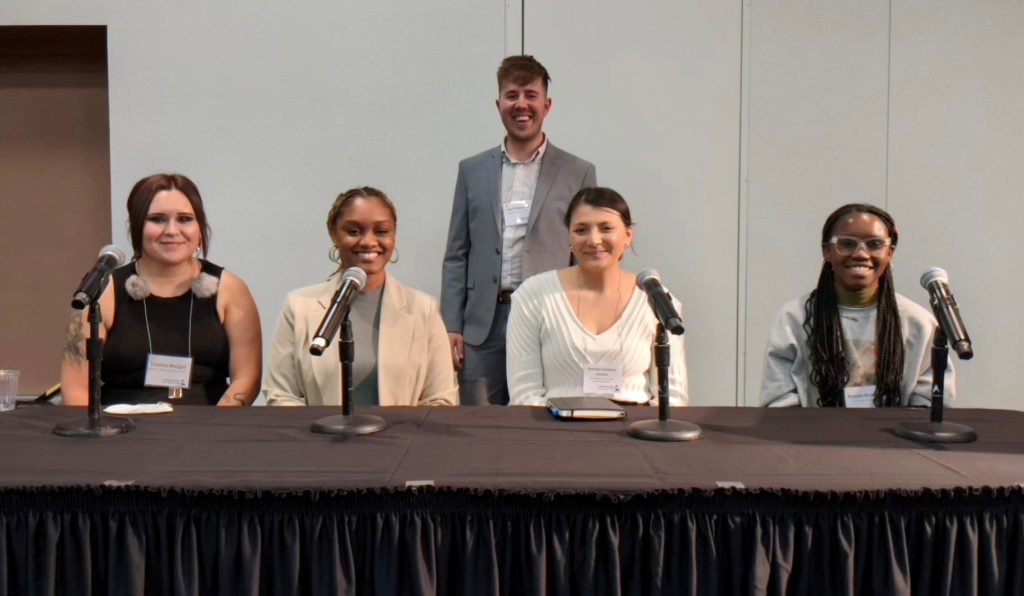
The HOW Youth Panel. From left to right: Lindsey Bacigal, Dynasty Caesar, Joe Fitzgerald, Brenda Santoyo, and Brooke Bowers. Image credit: Kirsten Shead
Sea Grant’s Social Science Outreach Specialist, Deidre Peroff, recently attended an inspiring conference and offered these reflections.
After a two-year hiatus due to the pandemic, we were finally able to host the 2022 Healing Our Waters/Great Lakes Conference in Milwaukee. It did not disappoint! There are so many things I love and respect about this organization and about this conference. What inspires me most is that they really “get it” concerning issues of environmental and social justice, and the importance of bringing diverse voices to the table – particularly those from BIPOC communities who traditionally have been underrepresented in environmental work.
This was obvious from the conference panelists, presenters, and attendees. When I looked around the room, I was inspired to see black and brown faces. When I sat back to hear the presenters, it was motivating to see these faces centered and leading discussion on important topics that affect us all and speaking from podiums, rather than in the background.
In addition, while there is a laundry list of topics that could be presented at a conference focusing on environmental issues in the Great Lakes, this conference takes a deep dive into topics and provides a platform to uplift voices of those most affected by the topics that are often overlooked in other events.
Some key questions addressed include: How can we create a communications plan to activate communities in environmental change? How have community voices been elevated in fighting PFAS and impacts on residents? What does climate resilience mean to Indigenous populations and those impacted by toxic drinking water? What should be policy priorities to advance equity in ensuring safe drinking water through drinking water infrastructure and water affordability? And, what can we learn from youth in strategizing the future of the environmental movement?
While all of these questions were important and influential, I found myself diligently scribbling notes on the key points that were addressed in the youth panel. I wanted to introduce these amazing panelists and share some of their points here:
Brooke Bowers, a youth leader for We the People of Detroit, has the eloquence and knowledge of someone decades older than her 14 years. When reflecting on the importance of engaging youth in solving complex environmental problems she pointed out, “Who is going to carry on your work when all of you are gone? If we, as the next generation, aren’t taught this stuff and given a voice, wouldn’t all of your work have gone to waste?”
The three other panelists included Brenda Santoyo, a senior policy analyst at Little Village Environmental Justice Organization in Chicago; Dynasty Caesar, senior campaign organizer at the Redress Movement in Milwaukee; and Lindsey Bacigal, communications coordinator at Healing Our Waters – Great Lakes Coalition in Michigan.
Another overlapping theme was the importance of equity in the approach people use to engage community members in solving problems. Bowers pointed out that, despite good intentions, she’s seen people come into her community with their own agenda without bringing local priorities to the forefront. She stated, “Don’t downgrade problems we have in our own communities as being insignificant to your agenda and stop trying to help us out without giving us a voice in our own community.”
Caesar agreed that without community involvement from the beginning, people end up working on solving what they think should be prioritized rather than what is needed in the communities they are trying to serve.
She urged participants to stop the “buy-in” to projects. With the approach of communities “buying in” to projects their voices are not centered in the development, and objectives are developed outside of the communities they are trying to serve. She stated, “Don’t let your grant limit your scope and shadow work already being done. Instead, just be a good neighbor – you can’t be successful if you don’t talk to neighbors, otherwise it’s just your agenda.”
Similarly, there was a discussion on how to be more accommodating and equitable in encouraging underserved communities to be environmental stewards. Caesar shared stories of how people often try to support environmental initiatives or purchase “sustainable” products but sometimes this is just not possible because of financial barriers and lack of accessibility. While it’s easy to tell someone that they are doing the wrong thing (e.g., using plastic bottles), deeper issues are usually hiding regarding trust in having safe drinking water and inequitable pricing on products advertised as “eco.” She argued the importance and stated, “How can we make this space not so elitist and make corporations more accountable?”
Finally, how can we better equip young people to come into this space and lift their voices? Bacigal expressed the need to respect and value youth outside of just having them represented as a “check box” (tokenism) but instead, listening to them and asking your organization, “how are we supporting youth?”
Bowers mentioned social media as a way to engage youth and others pointed out specifically that, while for decades the environmental movement has been predominately white, we all need to be intentional in creating more spaces for BIPOC involvement.
Santoyo also included that “burnout is real” and the need to prioritize mental and physical health in the workplace so that we can all support each other to do this tiring work… perhaps something we all know too well.
To wrap up, Caesar acknowledged, “This isn’t a personal attack on any of you, but it’s the reality of the situation. If you felt moved, take the time to change it. We are all on this planet and we need to take care of it and stop shaming people.”
Thank you to Joe Fitzgerald of Milwaukee Water Commons for putting this panel together and for the four “rock star” women on the panel. If this is what our next generation looks like we are indeed in good hands.


